Maye Musk’s Secrets to Successful Parenting
More than a half century after she started modeling, 74-year-old Maye Musk is entering yet another phase of her career with her cover appearance on the 2022 SI Swimsuit Issue.
The mother of three hasn’t always had an easy path. Despite the fact that her eldest son is now one of the wealthiest people in the world, Musk once struggled financially as a single parent before earning two master’s degrees and becoming a well-respected dietitian. The author of A Woman Makes a Plan: Advice for a Lifetime of Adventure, Beauty, and Success talks to SI about her own challenges in raising three successful children—restaurateur Kimbal Musk, film producer Tosca Musk and billionaire businessman Elon Musk—and gives advice for all parents struggling to balance a career while raising kids.
You’ve lived such a dynamic life. Why write a memoir?
Well, I had no intention of writing a book. I didn’t think I had a story. I didn’t know why anyone would want to read anything about my life, but my literary agent, who is a New Zealander living in Canada — two of the nicest countries in the world — she just wouldn’t leave me alone. So then I thought you had learned lessons because life is better in your 70s.
How did your children react to your writing a memoir of your life?
They said I needed to bring up my struggles. But I didn’t want to. We lived through tough times, and I didn’t want to tell anybody. Even my brothers and my twin sister had no idea how I suffered or that I was having problems in relationships, business or personal life. That’s because I never complained; I never said anything. People had no idea how poor I was; I never went out for dinner and we never went to the movies, but they didn’t realize that it was because I couldn’t afford it.

Maye Musk was photographed by Yu Tsai in Belize. Swimsuit by ERES. Earrings by Ottoman Hands. Necklace by Cleopatra's Bling. Bracelet by Mary McFadden provided by New York Vintage.
So your family didn’t realize how you were struggling?
Well, you know, we don’t [speak up] as women, and maybe we should let people know we’re going through a hard time, just get moral support. If I’d needed financial support, it would’ve been so I could afford to put a roof over our heads and feed my kids at a very low budget, but then I’m a dietician.
What would you feed your kids?
We’d eat very healthily with bean stew and raisin bread and milk and peanut butter sandwiches. You know you can eat very healthy if you can’t afford meat, fish or chicken. But then again, do I ask for money so that we can eat chicken? I mean, that sounds unnecessary. So I’ve never told anybody and people who have known me for a long time are surprised when they read my book. They had no idea that I was living in a rent-controlled apartment in Toronto or that I had five part-time jobs.
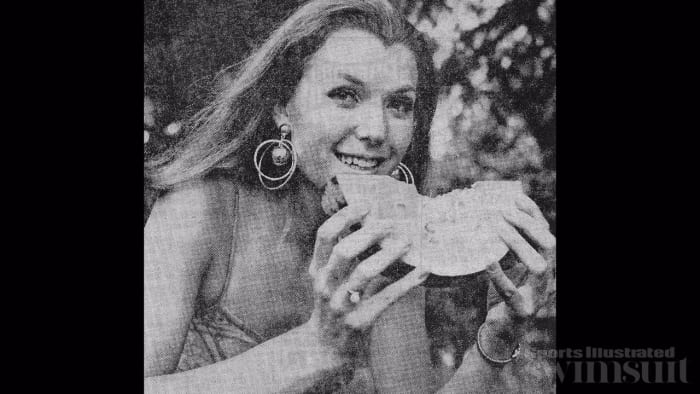
A young Maye Musk.
How do you think the struggles and hardships shaped how you parented your children?
Well, first of all, I think hardships are unnecessary. They don’t shape anything. You just think back, and you’re angry and bitter that you went through such a horrible time and didn’t get out of it sooner. I try not to think back like that. My children were shaped just like my parents shaped me and my brothers and sisters because we were all successful. We all studied. My parents worked long hours — from 6:45 a.m. until 6 p.m. We barely saw them until dinner. We were very independent. At 4 years old, my twin sister and I would walk to school, about a mile away or two away from home.
Were your children also quite independent?
My parents grew up very independently, as well, so when I brought up my kids, of course, I had to work long hours. In the beginning, I had to take them to nursery school but pretty much by Grade 2, they were taking a bus or walking. I could get secondhand school uniforms and used books. And my kids would walk or take a bus, which was inexpensive, too. So you can survive as a single mother. And I did, and they became very independent because they had to behave. I had my private practice in my home. It would be in a bedroom or at the dining room table, and the doctors would send patients to me. They didn't ask where my office was. I just gave them the address.
When you were talking about how you were raised, you lived quite an adventurous life with your parents. Has that played a role in your own parenting style?
Well, for instance, you learn a lot when you go to the Kalahari desert with a three-week supply of food, water and gas, sleeping on the desert floor in a sleeping bag. You have to shake your shoe every morning, so there are no scorpions inside. Pretty much after that, everything is a privilege and luxury. In my mid-30s, I went to do my hospital dietetics, so we stayed at the hospital, the children in the bedroom and me in the living room in a tiny apartment. By then, Kim and Tosca were living with me. Elon had gone to live with his father, and he would only come once a month or less [because he was living with his father].
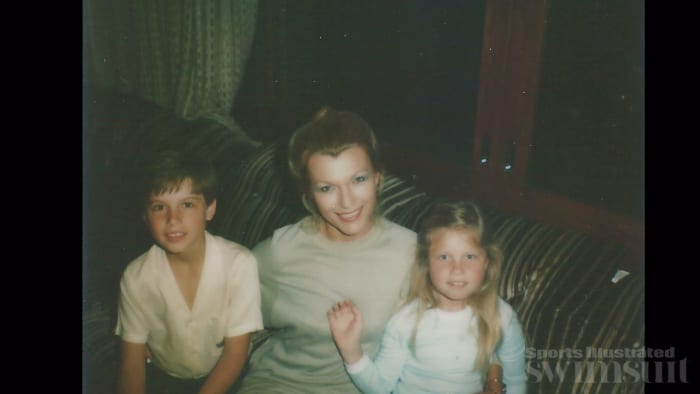
Maye Musk with family.
Do you carry any of those lessons with you now?
Even now, when I go to Starbase [the SpaceX launch site in Texas] where they’re launching rockets, I sleep in a bed in a garage — a garage is a luxury. That’s the only way I get to see the rockets, so the Kalahari did help me that way.
You have two master’s degrees and you’re a woman who has always pursued her passions. What is the key to doing that while still taking on the demanding role of being a parent?
You cannot be very ambitious when your children are very young. They depend on you. You're the main source of everything. I had three children in three years. In those early years, you pretty much focus on your children. You don’t work that much. I modeled until I was 21, which was quite good. Life comes in stages. You have different priorities, but as children go to school, they become independent and don’t need you around much. That’s when you can start developing more of a career.
Your book is about making a plan and then changing it if it doesn’t work out, but how do you apply that to parenting when raising kids can be so hard to plan?
You have to make more plans all the time because, of course, you’re taking your child somewhere, and suddenly he has to go to the toilet. So you make another plan, and you might miss a show or miss this or that. Having a child, you have to keep making plans, and they keep on changing. You just have to do your best because the main thing is you don’t want your child to get hurt, but they do because they climb trees and they get onto roofs.
What advice would you give to new parents nowadays?
Well, pretty much what I’ve been saying to you is that your priorities are your children. So you look after them, make sure they’re doing nice things, but get them to do something for you to make them more independent.
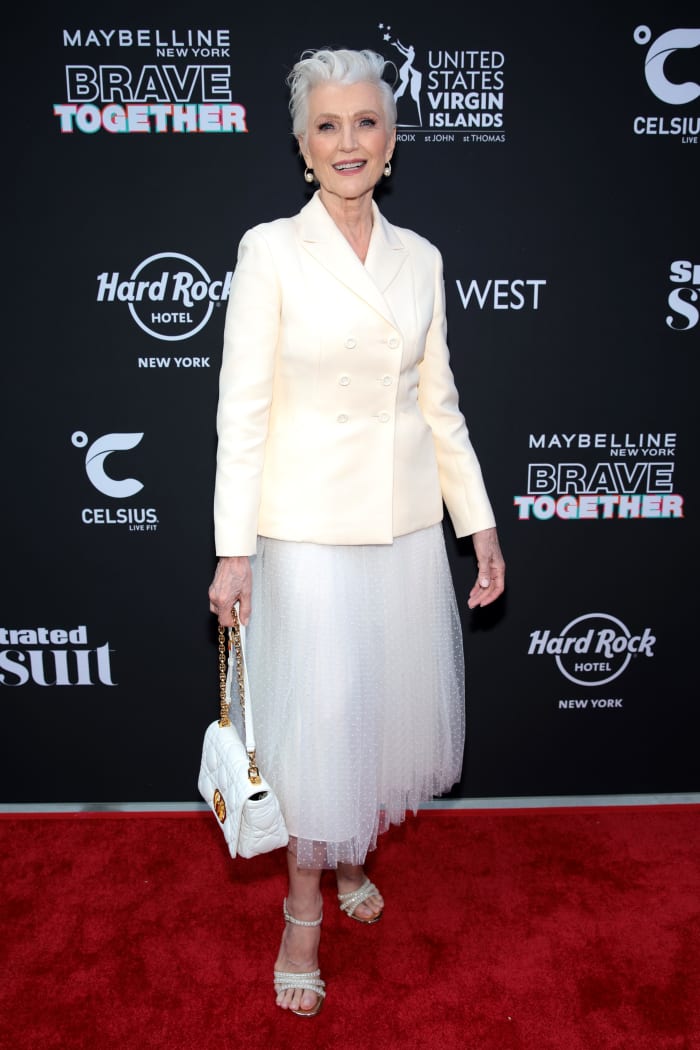
Maye Musk on the red-carpet in NYC for SI Swimsuit's Launch Party night one.
Dimitrios Kambouris/Getty Images
What’s your take on the intense mom guilt that so many women face today while juggling a career and parenthood?
I never had mom guilt, so I don’t know how to tell someone not to have mom guilt. Do the men have guilt? No, that’s the whole thing. So we want a little bit of gender equality going on here, maybe. Father guilt should be equal to mom guilt. And if the father doesn’t get guilt or the father isn't around, then there shouldn’t be mom guilt because you’re just trying to survive.
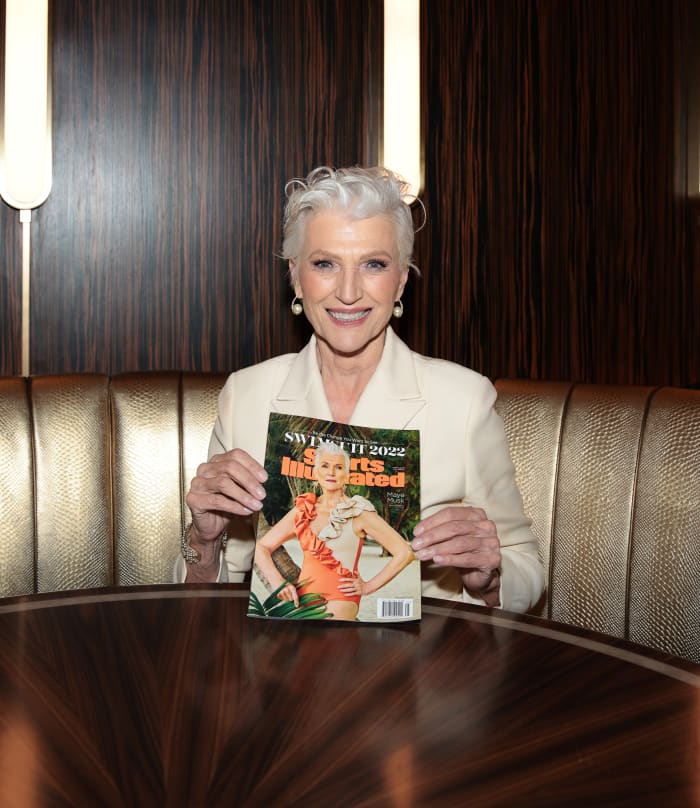
Maye Musk holding the 2022 SI Swimsuit.
Dimitrios Kambouris/Getty Images
